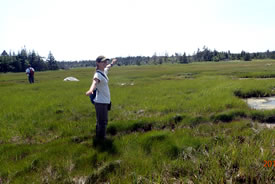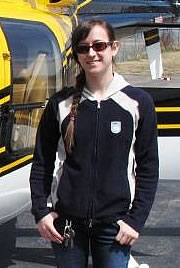Sometimes, not knowing the answer makes life a little more interesting

Danielle Horne in the field (Photo by NCC)
I first heard of the Nature Conservancy of Canada (NCC) during my undergraduate degree, which I completed a few years ago. NCC’s focus on working with willing landowners and taking a non-advocacy stance was what initially drew me to the organization, while the organization’s focusedapproach to land conservation has kept my attention. It was with a feeling of serendipity that I went out to the field to monitor a property and have an informal species identification lesson this past April with Bill Freedman, a long-time supporter of NCC and the professor who first introduced me to NCC.
I am now working for the NCC as the stewardship assistant in Nova Scotia, having just graduated this spring from the Master of Resource and Environmental Management program at Dalhousie University. I am enjoying this position, in part for the adventures and in part for the chance to put my newly honed skills to work. At times I find it hard to believe that I get paid to go out and have adventures like chasing butterflies.
Having spent my summers in Cape Breton, I am no stranger to the fickle weather found here in Nova Scotia. So far, we have been lucky to have mostly decent weather for our field work. And whether it is tromping through the bush in pouring rain while trying to conduct ecological classifications, or hiking through blisteringly sunny weather trying to find unmarked trails, our field days always come up with something to make me go, “wow.”
I still get excited when I come across the opportunity to identify a new species. Down in southwestern Nova Scotia for example, we found pine barren golden heather on one of our properties. This species is a member of the Atlantic Coastal Plains Flora, a unique group of taxonomically unrelated plants mainly restricted to flat land along the Atlantic coast from Florida to Nova Scotia.
In addition to surveying the plants on our properties, we are also keeping our eyes peeled for butterflies. This data will be contributed to the Maritimes Butterfly Atlas, a project run by John Klymko through the Atlantic Canada Conservation Data Centre.
Chasing butterflies reminds me of childhood experiences of racing across lawns after fluttering wings. Chasing them is not so hard, except the butterflies for which there is little data are often in harder to reach places. Imagine trying to catch one in a bog or a dense forest. Not so easy, but very entertaining if you are the person watching the proceedings. I am still amazed that one day I was even able to scoop a northern crescent butterfly out of the grass with only one hand!
These adventures are often the highlights of my job that I share with family and friends, but working for NCC is more than cool species and amazing vistas. I often get to collaborate on projects with other researchers and track down leads in my own research. Research isn’t as glamorous or exciting as field work, but I like it since these are often long-term projects for questions to which we don’t yet know the answers. It’s like trying to complete a puzzle, except we may not have all the pieces and we may not for years to come.
Some of these questions include:
- What is the best way of dealing with invasive species?
- What is the best way for NCC to monitor eel-grass (and what do we do if there is a change)?
- How can we get young adults to be involved in our Conservation Volunteers events?
There are many possible answers to these questions, but what the right one is, only time will tell.
As I move into the second half of my contract, I am very grateful to be able to work for NCC here in Nova Scotia. It has allowed me to make new contacts, work on projects that I have never worked on before, and helped shape the focus for my career. Working for NCC has given me the opportunity to add skills to my repertoire and apply the research skills that I honed in my master’s degree. But I am not wearing rose-coloured glasses; I know that after this contract is completed I will be on the hunt for another contract and it is a trend that I have accepted will probably continue for the next few years.
It’s difficult to find a long-term contract in the Maritimes in the conservation field. But, it is possible. The best place to start? It’s not at a job fair or on the internet. It’s in your community. Show the world that this work is important and volunteer for causes that are important to you. Go out and do the gritty work. The work that’s not glamorous. And take any opportunity that is presented to you. You never know where it may lead.
Sometimes, not knowing the answer makes life just a little more interesting.


